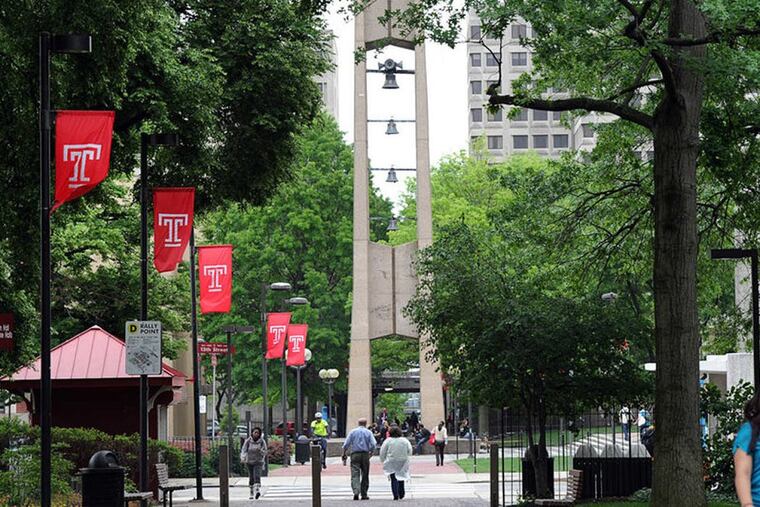In wake of biz school scandal, Temple faces more scrutiny for data falsification
U.S. News & World Report said the lapse at Fox raises questions about data from other programs at Temple and asked for a full accounting. A prestigious business school association also is investigating.

Days after it ousted its business school dean over inflated data on student applicants, Temple University on Wednesday scrambled to respond to a new wave of scrutiny both within and outside the university.
U.S. News and World Report, the magazine whose national college rankings have become a prized benchmark, pressed Temple to certify the accuracy of data on all its academic programs.
One accrediting agency said it had launched its own review of the university's student data, and another said it was monitoring the situation. Temple administrators were scheduled to meet with faculty. And more students mulled whether they had been unfairly duped into entering the now-tainted online M.B.A. program.
"There are probably a lot of students on the sidelines who didn't know what to think," said Jason Brown, an attorney representing students who have sued the university over the issue. "Now that it's corroborated, they're livid."
Temple said it will take steps to shore up its rankings data university-wide to protect the integrity of the institution.
Allegations that the Fox School of Business misrepresented data for applicants for its online M.B.A. program — helping the program win a top slot in U.S. News' annual rankings — surfaced in January and bubbled for months. But they were stoked Monday after the university released findings from its own investigation and forced out its longtime business school dean, Moshe Porat, who had led the school for more than two decades.
The review by the Jones Day law firm found that the school misrepresented the number of students who took the GMAT test from 2015 to 2018, overstated their average undergraduate grade point averages, and erred in providing the number of offers of admission and the amount of student debt. The firm said problems were not limited to the online M.B.A., but also impacted other Fox programs.
Before U.S. News dropped the online M.B.A. program from its rankings for misrepresenting data, the fast-growing program had topped the national list for four straight years.
In the wake of the Jones Day investigation, U.S. News asked Temple to provide letters certifying the accuracy of data on all of its programs that are ranked, including its graduate programs in education, engineering, law, medicine, and nursing, and its undergraduate program.
"The scope and duration of the misreporting at Fox calls into question all of Temple University's submissions to U.S. News," Brian Kelly, editor and chief content officer, wrote in a letter Tuesday to Temple president Richard M. Englert.
An international association of business schools, from which Temple has accreditation, also is looking into the lapses and may move up the date of a previously scheduled "peer review" visit to the school. It is rare for the association to revoke certification.
"We take this very, very seriously," said Stephanie Bryant, executive vice president and chief accreditation officer for the Association to Advance Collegiate Schools of Business. "We are actively investigating this."
The Middle States Commission on Higher Education, the main accrediting body for colleges, is also monitoring, said spokesperson Brian Kirschner.
Temple said Wednesday it will hire an external auditor for at least three years to review all Fox rankings submissions and spot-check those of other Temple schools and colleges.
"It is clear that the university needs to implement new processes to ensure the highest degree of data integrity," provost JoAnne A. Epps said in an email to the Temple community.
In addition, the university promised to institute new practices to insure the integrity of its rankings data, hire new employees to help in the effort, and train staff.
At least one Fox employee besides Porat has been fired, a source close to the matter said, and other employees face discipline.
Other faculty at the school were upset that a school with such talent had been upended.
"The Fox faculty I've spoken with are saddened by this but not entirely surprised," said Steve Newman, an associate professor of English and president of the Temple faculty union, noting that faculty had been concerned for a while about the school's growing "culture of pursuing rankings at all costs."
Art Hochner, former union president and an emeritus business professor who worked at Fox for about 40 years and taught in the online M.B.A. program, was dismayed, too.
"They look for good publicity and then end up with scandal," said Hochner.
On Wednesday afternoon, Englert and Epps met with 150 faculty members. Some had been concerned about the impact of the scandal on the school; others didn't like the way the dean had been treated.
"I wanted to acknowledge all the good things Dean Porat has done in his 22 years at the school," law professor Samuel Hodge Jr. said after the meeting. "Who crafted this report? Was it a committee or one person? They couldn't answer."
The lawsuit filed by Brown names nine Temple M.B.A. students, though he said 30 students are involved. He also said his firm got about 30 new calls on the issue in the 24 hours after the findings were released this week.
Porat, 71, has not returned calls for comment. He refused to resign when asked by Epps and Englert and was removed from the position, a university spokesperson said. He has the right to remain as a tenured faculty member.
In March — two months after it became public that misrepresentations in the data provided to the magazine were discovered and an investigation was underway — Porat told faculty that he didn't know about the misstated data before it was discovered and that everyone would have to wait for the investigation to conclude, Hochner said.
"He denied knowledge of what had gone on," Hochner said. "He said he didn't know what happened."